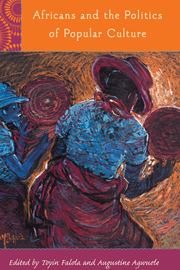Book contents
- Frontmatter
- Contents
- List of Illustrations
- Preface
- Introduction
- 1 From Primitive to Popular Culture: Why Kant Never Made It to Africa
- Part One Politics of Culture in Habitual Customs and Practices
- Part Two Politics of Culture in Popular Representations: Films and Performances
- 7 Reclaiming the Past or Assimilationist Rebellion? Transforming the Self in Contemporary American Cinema
- 8 Neither Bold nor Beautiful: Investigating the Impact of Western Soap Operas on Kenya
- 9 The Lions in the Jungle: Representations of Africa and Africans in American Cinema
- 10 Sexuality in Caribbean Performance: Homoeroticism and the African Body in Trinidad
- 11 Family Health Awareness in Popular Yorùbá Arts
- Part Three Politics of Culture in Popular Texts
- List of Contributors
- Index
- Rochester Studies in African History and the Diaspora
9 - The Lions in the Jungle: Representations of Africa and Africans in American Cinema
from Part Two - Politics of Culture in Popular Representations: Films and Performances
Published online by Cambridge University Press: 12 September 2012
- Frontmatter
- Contents
- List of Illustrations
- Preface
- Introduction
- 1 From Primitive to Popular Culture: Why Kant Never Made It to Africa
- Part One Politics of Culture in Habitual Customs and Practices
- Part Two Politics of Culture in Popular Representations: Films and Performances
- 7 Reclaiming the Past or Assimilationist Rebellion? Transforming the Self in Contemporary American Cinema
- 8 Neither Bold nor Beautiful: Investigating the Impact of Western Soap Operas on Kenya
- 9 The Lions in the Jungle: Representations of Africa and Africans in American Cinema
- 10 Sexuality in Caribbean Performance: Homoeroticism and the African Body in Trinidad
- 11 Family Health Awareness in Popular Yorùbá Arts
- Part Three Politics of Culture in Popular Texts
- List of Contributors
- Index
- Rochester Studies in African History and the Diaspora
Summary
During the twentieth century, more than two hundred films about, set in, or dealing with Africa were made in the United States. Yet most Americans have never experienced Africa firsthand, and it could be argued that America has had stronger financial and ideological ties to the Middle East or Latin America. Despite this, Africa exists as a fascinating and well-defined place in the American imagination. Even those without personal experience of Africa can describe what it ought to be like: dark, lush jungles, broad grasslands, sweltering deserts, and, in the distance, drums and animal noises; a place of breathtaking beauty with shades of adventure and danger. Americans can confidently describe an Imagined Africa because they are steeped in the American discourse about Africa. “Africa,” for Americans, is a construct, an idea that encompasses the British imperial experience, ideas of race, America's position in the world, and concepts about the Other (conceived as the developing world in general, and also specifically Africa). American ideas about Africa, through the medium of film, have included racialized and gendered tropes that defined Africans as either faithful servants or dangerous savages, and presented Africa as a place of beauty and danger, and most importantly, as a place for white people to act in, fall in love in, change, and dominate. These notions, reflected and reinforced by popular culture, the media, the government, and, for a long time, experts on Africa, created a discourse, a pervasive language through which Africa was and is encountered.
- Type
- Chapter
- Information
- Africans and the Politics of Popular Culture , pp. 214 - 236Publisher: Boydell & BrewerPrint publication year: 2009

